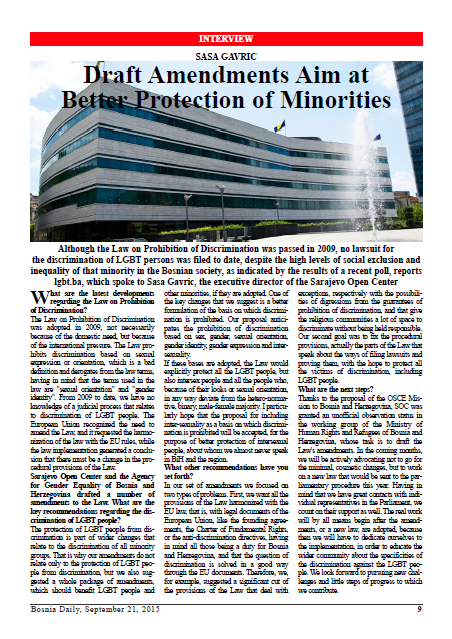Bosnia Daily: Draft Amendments Aim at Better Protection of Minorities

Bosnia Daily, September 21, 2015
PDF version available HERE.
Although the Law on Prohibition of Discrimination was passed in 2009, no lawsuit for the discrimination of LGBT persons was filed to date, despite the high levels of social exclusion and inequality of that minority in the Bosnian society, as indicated by the results of a recent poll, reports lgbt.ba, which spoke to Sasa Gavric, the executive director of the Sarajevo Open Center.
What are the latest developments regarding the Law on Prohibition of Discrimination?
The Law on Prohibition of Discrimination was adopted in 2009, not necessarily because of the domestic need, but because of the international pressure. The Law prohibits discrimination based on sexual expression or orientation, which is a bad definition and derogates from the law terms, having in mind that the terms used in the law are “sexual orientation” and “gender identity”. From 2009 to date, we have no knowledge of a judicial process that relates to discrimination of LGBT people. The European Union recognized the need to amend the Law, and it requested the harmonization of the law with the EU rules, while the law implementation generated a conclusion that there must be a change in the procedural provisions of the Law.
Sarajevo Open Center and the Agency for Gender Equality of Bosnia and Herzegovina drafted a number of amendments to the Law. What are the key recommendations regarding the discrimination of LGBT people?
The protection of LGBT people from discrimination is part of wider changes that relate to the discrimination of all minority groups. That is why our amendments do not relate only to the protection of LGBT people from discrimination, but we also suggested a whole package of amendments, which should benefit LGBT people and other minorities, if they are adopted. One of the key changes that we suggest is a better formulation of the basis on which discrimination is prohibited. Our proposal anticipates the prohibition of discrimination based on sex, gender, sexual orientation, gender identity, gender expression and intersexuality. If these bases are adopted, the Law would explicitly protect all the LGBT people, but also intersex people and all the people who, because of their looks or sexual orientation, in any way deviate from the hetero-normative, binary, male-female majority. I particularly hope that the proposal for including inter-sexuality as a basis on which discrimination is prohibited will be accepted, for the purpose of better protection of intersexual people, about whom we almost never speak in BiH and the region.
What other recommendations have you set forth?
In our set of amendments we focused on two types of problems. First, we want all the provisions of the Law harmonized with the EU law, that is, with legal documents of the European Union, like the founding agreements, the Charter of Fundamental Rights, or the anti-discrimination directives, having in mind all those being a duty for Bosnia and Herzegovina, and that the question of discrimination is solved in a good way through the EU documents. Therefore, we, for example, suggested a significant cut of the provisions of the Law that deal with exceptions, respectively with the possibilities of digressions from the guarantees of prohibition of discrimination, and that give the religious communities a lot of space to discriminate without being held responsible. Our second goal was to fix the procedural provisions, actually the parts of the Law that speak about the ways of filing lawsuits and proving them, with the hope to protect all the victims of discrimination, including LGBT people.
What are the next steps?
Thanks to the proposal of the OSCE Mission to Bosnia and Herzegovina, SOC was granted an unofficial observation status in the working group of the Ministry of Human Rights and Refugees of Bosnia and Herzegovina, whose task is to draft the Law’s amendments. In the coming months, we will be actively advocating not to go for the minimal, cosmetic changes, but to work on a new law that would be sent to the parliamentary procedure this year. Having in mind that we have great contacts with individual representatives in the Parliament, we count on their support as well. The real work will by all means begin after the amendments, or a new law, are adopted, because then we will have to dedicate ourselves to the implementation, in order to educate the wider community about the specificities of the discrimination against the LGBT people. We look forward to pursuing new challenges and little steps of progress to which we contribute.